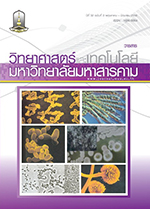การปรับตัวของเกษตรกรในการสร้างความยืดหยุ่นของฟาร์ม: กรณีศึกษากลุ่มเกษตรกร ปิงน้อย จังหวัดเชียงใหม่
Main Article Content
บทคัดย่อ
บทคัดย่อ
ความคิดความยืดหยุ่นเป็นกรอบการทำงานเพื่อสร้างความเข้าใจความสัมพันธ์ของระบบนิเวศน์ และสังคมที่ช่วยให้เกษตรกรรับมือกับการเปลี่ยนแปลงและความไม่แน่นอน ทำให้ทฤษฎีความยืดหยุ่นสามารถใช้เป็นกรอบสำหรับการวิเคราะห์ความยั่งยืนของฟาร์ม
บทความนี้ผู้วิจัยมองระบบฟาร์มเป็นระบบปรับตัวที่มีความซับซ้อน และเพื่อให้บรรลุความยั่งยืนของฟาร์มเกษตรกรจำเป็นต้องสร้างทางเลือกใหม่โดยการบูรณาการความหลากหลายของกิจกรรมการผลิตโดยผ่านการทดลองและการปฏิบัติบทความนี้ต้องการนำเสนอการเปลี่ยนแปลงและกลยุทธ์ที่เกษตรกรใช้ในการจัดการวัฏจักรการปรับตัว ได้ประเมินความยั่งยืนของฟาร์มโดยการวิเคราะห์การปรับตัวและความสามารถในการรับมือต่อการเปลี่ยนแปลงโดยยังคงรักษาโครงสร้างและหน้าที่ งานวิจัยนี้ได้ ทำงานร่วมกับเกษตรกรรายย่อยที่ปรับเปลี่ยนไปเป็นระบบการผลิตพืชผักปลอดสารพิษในอำเภอ สารภีจังหวัดเชียงใหม่
ความยืดหยุ่นปรากฏเมื่อเกษตรกรสามารถรับมือกับสิ่งรบกวนต่าง ๆ และเมื่อการผลิตในฟาร์มถูกปรับให้สอดคล้องกับนิเวศน์ในท้องถิ่นและตอบสนองต่อตลาดที่หลากหลาย ซึ่งสรุปว่าการเปลี่ยนระบบการผลิตเป็นเกษตรยั่งยืนเพียงอย่างเดียวอาจเป็นเงื่อนไขที่ไม่เพียงพอสำหรับให้เกิดความยืดหยุ่นของฟาร์ม สิ่งท้าทายคือ ความสามารถในการปรับตัว การเรียนรู้และการจัดระเบียบตนเอง
คำสำคัญ: ความยืดหยุ่นของฟาร์ม วัฏจักรการปรับตัว ระบบสังคม-นิเวศน์ เกษตรยั่งยืน ผักปลอดสารพิษ
Abstract
Resilience thinking offers a framework for understanding socio-ecological systems that enable farmers to cope with changes and uncertainties, and thus resilience theory can be a useful framework for analyzing farm sustainability.In this paper we conceptualize the farming system as a complex adaptive system, and to achieve farm sustainability,farmers need to create new options by integrating diversity through experimentation and implementation. We explore the nature of change and strategies that farmers manage to navigate an adaptive cycle. We then assess farm sustainability through adaptability, and capacity to undergo change and still retain structure and function.
Participatory research approach was employed to work with smallholder farmers in Saraphe district, Chiang Mai province, who had adopted pesticide-free vegetable-based production systems. Resilience is emerged when farmers are able to cope with various disturbances, when farm production is adjusted to local ecological niches and differentiated markets. We conclude that conversion alone to sustainable agriculture may not be sufficient conditions to ensure farm resilience. Ability to adapt, learn, and self-organize is a real challenge.
Keywords: farm resilience, adaptive cycle, socio-ecological systems, sustainable agriculture, pesticide free vegetable

